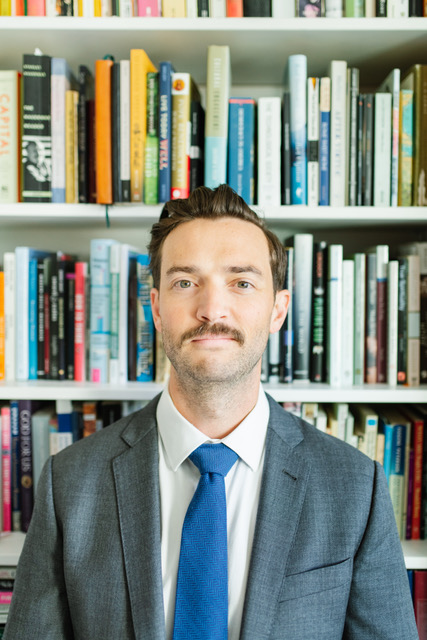
“I used to explain to my kids that I worked with the police but I wasn’t a police officer,” says Allard Law alum Sean Hedley (JD ’ 15). “Now I explain that I work for the airplane company but I’m not a pilot. They consider both occupations equally unexciting.”
Hedley first found himself drawn to in-house counsel work after five years of working as a prosecutor. Since landing a role as legal counsel with WestJet, Hedley says he’s found a fulfilling and dynamic career that also offers the work-life balance he needed as a new parent.
Here, he discusses his experience working both as a prosecutor and as legal counsel at WestJet, and offers advice to law students and practicing lawyers who might be interested in working as in-house counsel.
You’ve had an interesting career trajectory shifting, from prosecutor to in-house counsel. What first got you interested in working as a prosecutor?
Initially I had no particular interest in criminal law. But my brief time in prosecution as an articling student with the Federal Crown gave me a tremendous amount of independence, ownership and courtroom experience very early on.
The public interest mandate was also deeply meaningful for me. So I gravitated toward that immediately and cannot recommend it highly enough. Nowhere else can you independently run your own trial from start to finish as a first-year call.
What are some of the challenges you had to overcome when making the switch from prosecutor to in-house counsel at WestJet?
Getting into an in-house counsel role without any private firm experience is an uphill challenge. Aside from a summer student job in employment law (at UBC), I had relatively little experience in the key portfolios I would be filling. Fortunately for me WestJet was interested in other things as well, like communication style and cultural fit. I was able to get my foot into the door primarily by presenting well, and then I acknowledged my blind spots and emphasized my eagerness to learn.
One of my interviewers held up a fat Canada Labour Code and asked how quickly I could learn it. In response, I held up a Criminal Code and pointed out that even though I didn’t know every provision, I knew how to it worked and that was what mattered.
It’s said that in-house lawyers wear multiple hats. What are some of the hats you wear?
Watchdog – Tracking developments in the law and monitoring internal compliance to ensure we’re following through on our obligations and minimizing risk.
Advocate – Defending our people, decisions and interests in adversarial forums.
Businessperson – Advising and decision-making in practical ways that minimize risk and reduce costs.
Referee/Peacemaker – Business leaders will often look to Legal to resolve disagreement about how best to approach tricky questions, whether or not the questions are legal in nature!
Would you say you have a good level of work-life balance in your position? How do maintain a work-life balance in a demanding career?
Compared to most legal careers, the balance is very good. During law school I met a senior in-house lawyer who gave me the distinct impression his job was essentially playing a lot of solitaire and taking occasional phone calls. If that was ever the landscape of the work, it isn’t anymore. Every competitive industry moves quickly and I have a very full plate. But the culture and leadership are also supportive of life outside of work, and I think this is still true for many in-house roles. I’m able to enjoy time with my family on weekends without stressing about my Monday morning.
Do you travel often? Do you have a favorite travel destination?
So far I’ve mostly just used the employee travel perks to see the Blue Jays in Toronto. But I hope to soon fly my family to Rome, or do some snowboarding in Japan.
We have seen an increase in demand and interest for in-house counsel positions. What advice do you have for law students and associates interested in an in-house role?
If you don’t feel like a legal expert, don’t sweat it. I like to joke that the job of in-house counsel is Professional Guesser, because I spend all day getting hard questions to which I rarely have quick answers. But with experience, knowledge, curiosity and a bit of research you can become a very effective educated guesser, which is a core in-house competency. So focus on gaining valuable experience and building problem-solving skills.
How has your experience at Allard impacted your career trajectory?
I was offered a lot of variety—not just in areas of the law, but in social perspectives, teaching styles, and thought traditions. I learned that legal reasoning and persuasion were strongest when informed by cultural, historical, economic, and even literary traditions.
Some highlights included Professor Janine Benedet’s thought-provoking criminal law discussions, a seminar on natural law theory, and a first-year field trip through the history of property lines in Vancouver with Professor Douglas Harris. I try to draw on that variety in my work as legal counsel, recognizing that the most effective way to balance risk or to argue a point is to fully account for the history and context of those decisions.
What advice would you give your law student self?
Study what you want to, not what you think you should. Sooner or later everyone learns that devoting your time to something you don’t care about is unsustainable. Getting a well-rounded education is very important, but studying the things that fascinate you most will serve you well even in the long run.
First published on August 25, 2023.